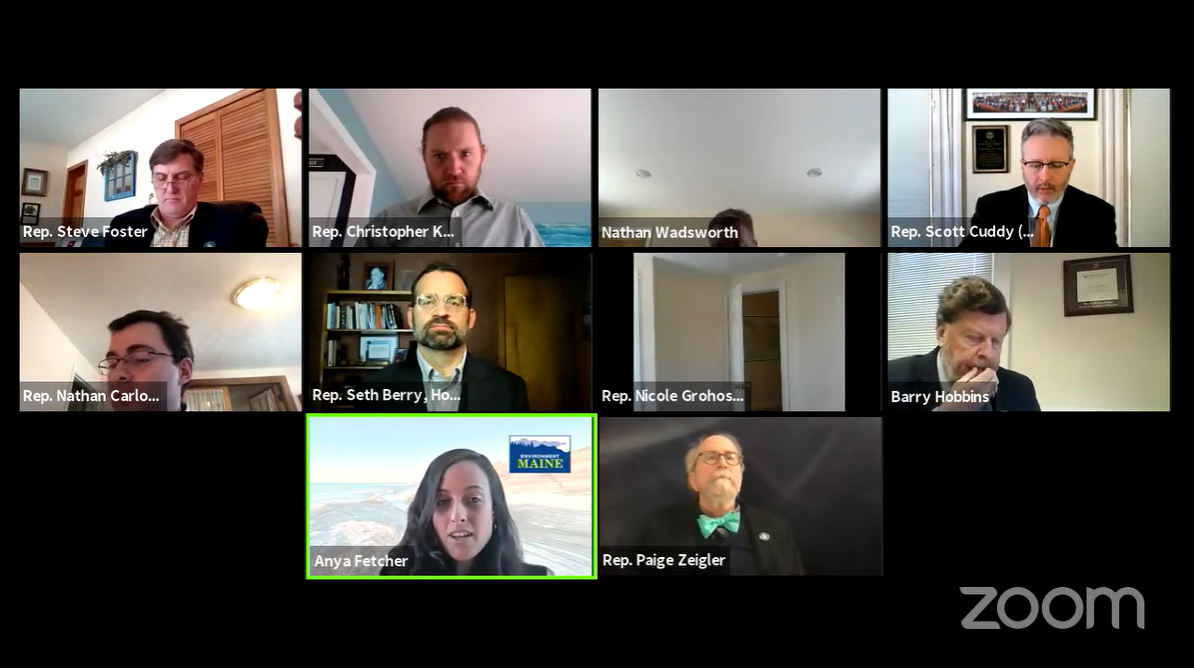Anya Fetcher
On March 16, 2021, Environment Maine’s State Director Anya Fetcher testified before the Maine Joint Standing Committee on Energy, Utilities, and Technology in opposition of LD 249, a proposed bill to eliminate the current net energy billing policy in Maine. You can view the full recording of the hearing here. Begin at minute 2:44:40 to watch from the beginning, or jump to our testimony, which begins at 3:18:04.

Below is the written testimony submitted to the committee:
Good morning, Senator Lawrence, Representative Berry, and members of the Joint Standing Committee on Energy, Utilities, and Technology. My name is Anya Fetcher and I’m the state director of Environment Maine, a citizen-based environmental advocacy organization. Thank you for the opportunity to present testimony today.
I speak on behalf of our members across the state when I urge you to oppose LD 249, LD 583, and LD 634. If passed, these bills will effectively disincentivize rooftop solar in the state. Instead of attacking solar energy and the thousands of Mainers who have invested in solar panels, we should work to continue pursuing policies that will enable more clean electricity generation from the sun. This is why we are asking the committee to oppose these three bills.
If we are to consider removing a net-metering policy, we should first consider all of the benefits of distributed solar energy that are being removed and disincentivized. Evaluation of the value of distributed solar energy and cost of net metering should account for the full array of benefits that distributed solar generation delivers to the utility, ratepayers and society. A recent study from Environment America Research and Policy Center and Frontier Group, The True Value of Solar: Measuring The Benefits of Rooftop Solar Power, defines each of these benefits and groups them into categories: benefits to the grid and all of the energy customers who depend on it, and benefits to society as a whole.
First, benefits to the grid and to the energy customers of Maine: By incentivizing solar energy locally, we limit the need to generate power at centralized fossil fuel plants and reduce the need for costly investments in power distribution and transmission. Since they generate electricity at the point of use, solar panels can also improve grid efficiency and save costs by reducing the amount of energy lost during distribution and transmission as well as create a more resilient grid in the event of an emergency or blackout. These grid benefits are valuable to the utility and to every ratepayer, not just those with panels on their roofs, reducing costs and improving service across the board.
Distributed solar resources also deliver valuable benefits beyond the grid. The societal benefits from fewer global warming emissions are immense: The carbon emissions of our current energy system cost the U.S. billions of dollars in economic and social damages each year, so transitioning to clean energy like solar is paramount for our physical and economic health.
In order for us to continue moving towards a clean and healthy future for Maine, we must encourage renewable energy adoption and can do this through net-metering. Net-metering is critical for Mainers to be able to invest in solar energy.
As the climate crisis looms, we must support Mainers who look to decentralize our current energy grid with renewable energy sources. We all want clean air and water for our future in Maine, one way to do that is to continue the support of net-metering for solar users.
We respectfully urge you to vote “ought not to pass” on LD 249, LD 583, and LD 634.
Thank you.
